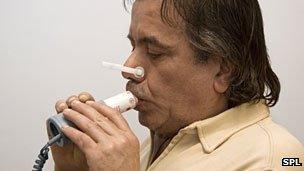Breathlessness too often ignored as lung disease sign
- Published

A simple breathing test can confirm a diagnosis of COPD.
Imagine being permanently short of breath with a cough that is hard to get rid of and finding even the simplest of everyday tasks a challenge.
Imagine constantly fighting off chest infections and living with a progressive lung disease for which there is no cure.
For 65-year-old Anthony Rhodes, from Wigan, no imagination is required.
"I don't leave my bedroom on bad days. It can be terrible. I find I can't even get to the bathroom because I feel like there's a heavy weight on my chest.
"I start gasping, that makes me panic which then makes everything worse.
"When you have nobody to help you, it's very frightening."
Anthony has chronic obstructive pulmonary disease or COPD, a slowly progressive lung disease which has been diagnosed in about 900,000 people in the UK.
COPD is a term used to describe a number of conditions, including chronic bronchitis and emphysema.
It is estimated that there are another 2.8 million people in the UK who have COPD, but do not realise it because they confuse their symptoms with getting older and being 'out of shape'.
What they all have in common are damaged airways in the lungs, which makes the simple process of breathing air in and out particularly difficult.
"There have been a few times when I've had to walk for three or four minutes to get to the car and I've got into trouble," Anthony says.
"Sometimes I can't shout for help and I'm left wondering where the next breath is coming from. I remember thinking: 'This is it'. At its worst it's very debilitating."
Although most cases of COPD are linked to smoking, Anthony's condition is a direct result of the asthma he has had since he was six months old.
Childhood breathing problems only improved in his early teens when he got his first inhaler, which he remembers as a "miracle" because it enabled him to live a more normal life.
Over the past three years, however, Anthony says his condition has worsened.
He has nasty infections on his chest all the time and takes a cocktail of tablets, potions and antibiotics to try to get rid of them.
June Roberts, a consultant nurse in respiratory medicine in Salford, says there are many people out there who are ignoring the deteriorating health of their lungs.
"Most people who get a diagnosis of COPD are in the moderate or severe stages of the disease. This has big implications on patients and what we can do for them. The earlier we can catch it the better."
Roberts is one of a group of experts across the country helping the Department of Health to drive awareness of COPD and encourage people with breathing problems to come forward for testing at their GP's practice.
The best way to confirm diagnosis is through spirometry, a simple breathing test which involves blowing into a machine. This will indicate whether airways have narrowed.
People should not assume COPD is terrible news, Roberts says, because giving up smoking and keeping fit and healthy will all lead to an improved quality of life.
"Breathlessness is frightening but COPD is like training for a marathon. You have to keep as fit as you can."
The British Lung Foundation describes how breathlessness can often become a vicious circle.
"People with COPD may reduce their activities to avoid becoming breathless. But by reducing activity levels you become less fit and therefore get breathless even sooner when you try to do any activity."
There is also the danger that people with COPD could become anxious and depressed as a result of having to adapt their lifestyles.
And the profile of patients with COPD is changing. No longer are they 'old smokers'. Instead it is more and more likely they are young women, who are more susceptible to lung cancer, and who started smoking as girls.
Doctors now look for signs of COPD in people as young as 35.
Even if people like Anthony cannot change the slow progression of his lung disease, his experience is a telling reminder to those who can.
- Published24 May 2010